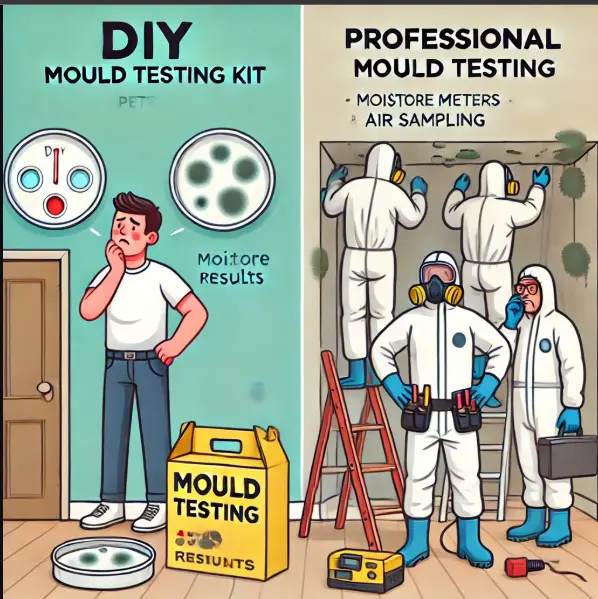Why DIY Mould Testing Falls Short

Why DIY Mould Testing Falls Short: The Importance of Professional Mould Testing
Mould is a common problem in many homes, particularly in humid climates like Brisbane. While it’s tempting to tackle mould on your own, especially with the availability of DIY mould testing kits, these methods often fall short. Professional mould testing offers a level of accuracy and thoroughness that DIY kits simply cannot match. In this article, we’ll explore why DIY mould testing is inadequate and why professional mould testing is essential to ensuring your home is mould-free.
The Limitations of DIY Mould Testing Kits
DIY mould testing kits are designed to detect mould in the home, but their effectiveness is limited. Here are some of the key reasons why they often fail to provide an accurate picture of the mould situation in your home:
1. Limited Scope
DIY kits typically involve placing a petri dish in an area of the home to collect mould spores from the air. While this can give you some indication of mould presence, it doesn’t account for hidden mould, which is often the real problem. Mould can grow behind walls, under floors, or in roof spaces, areas that DIY kits cannot detect.
Professional mould testing, on the other hand, involves both air sampling and surface sampling in multiple areas of the home. This allows for a comprehensive assessment of both visible and hidden mould.
2. Inaccurate Results
The results from DIY kits are often unreliable. Petri dish-based tests are not designed to give an accurate count of mould spores, and they cannot differentiate between different types of mould. Knowing the type of mould present is important because some mould species are more hazardous to health than others.
For example, black mould (Stachybotrys chartarum) produces toxic spores that can cause severe respiratory issues, while other moulds may cause milder allergic reactions. Without knowing the type of mould, it’s difficult to assess the risks and determine the appropriate removal strategy. Professional testing provides accurate identification of mould species, giving you the information needed to protect your health and home.
3. No Expert Analysis
DIY kits give you basic results but no expert interpretation. Even if a DIY kit indicates that mould is present, it doesn’t explain the extent of the problem or the potential health risks. Professional mould testing, on the other hand, includes expert analysis of the results. At The Mould Group, our professionals provide a detailed report that not only identifies the types of mould but also explains the severity of the issue and offers recommendations for remediation.
Why Professional Mould Testing is Superior
Professional mould testing is a more thorough and reliable method of detecting mould in your home. Here’s why it’s essential:
1. Comprehensive Detection
Professional mould testing involves a combination of air sampling, surface sampling, and moisture detection to assess the presence of mould. These methods provide a complete picture of mould in the home, including areas where mould may be hidden.
- Air sampling detects mould spores in the air, even if there are no visible signs of mould.
- Surface sampling helps identify mould growing on walls, ceilings, or other surfaces.
- Moisture detection identifies areas where dampness is present, which can indicate mould growth in hidden areas, such as behind walls or under floors.
By using these methods, professional mould testing can detect mould in places that DIY kits cannot reach.
2. Accurate Identification of Mould Species
One of the most significant advantages of professional mould testing is the ability to accurately identify the species of mould present. Different types of mould have different levels of health risks. Some, like Cladosporium or Penicillium, may cause mild allergic reactions, while others, like Stachybotrys (black mould), can produce toxins that are harmful to human health.
Professional testing ensures that you know exactly what type of mould is in your home, allowing for appropriate remediation based on the severity of the mould problem. This is crucial for ensuring that your home is safe, particularly for those with allergies, asthma, or weakened immune systems.
3. Expert Remediation Recommendations
After testing, professionals provide a detailed report that explains the test results and offers recommendations for mould removal and prevention. At The Mould Group, we not only provide accurate testing but also guide you through the steps necessary to eliminate the mould problem.
This can include:
- Identifying the source of moisture that caused the mould in the first place.
- Recommending strategies for improving ventilation to prevent future mould growth.
- Suggesting professional mould removal services, particularly for severe infestations.
This level of expertise is critical for addressing the root cause of mould problems and preventing them from returning.
Health Risks of Inadequate Mould Detection
Mould can cause a range of health issues, especially for vulnerable individuals such as children, the elderly, and people with asthma or weakened immune systems. Failing to detect mould, or relying on inaccurate DIY results, can leave you exposed to mould spores that cause:
- Respiratory problems: Shortness of breath, coughing, and wheezing.
- Allergic reactions: Sneezing, runny nose, itchy eyes, and skin rashes.
- Asthma flare-ups: Mould is a known trigger for asthma attacks and can exacerbate symptoms in individuals with asthma.
The health risks associated with mould are serious, and relying on DIY kits that miss hidden mould can lead to prolonged exposure and worsening health conditions. Professional mould testing ensures that all mould is identified and addressed, reducing the risk of long-term health problems.
The Process of Professional Mould Testing at The Mould Group
At The Mould Group, we offer a comprehensive mould testing process to ensure your home is safe from the risks of mould exposure. Our process includes:
- Initial Inspection: We conduct a thorough inspection of your home, looking for visible signs of mould and areas prone to moisture buildup, such as bathrooms, kitchens, and basements.
- Air Sampling: We take air samples from multiple areas of the home to detect airborne mould spores.
- Surface Sampling: In areas where mould is suspected but not visible, we collect surface samples for lab analysis.
- Moisture Detection: Using advanced tools, we measure moisture levels in walls, floors, and ceilings, identifying areas where mould may be growing out of sight.
- Detailed Report: Once testing is complete, we provide a comprehensive report that includes the type of mould present, its concentration, and recommendations for removal.
Conclusion: Trust the Experts for Mould Testing
While DIY mould testing kits may seem convenient, they cannot provide the accuracy, thoroughness, or expert analysis needed to truly protect your home from mould. Professional mould testing offers a complete assessment of your mould problem, ensuring that hidden mould is detected, and the appropriate steps are taken to remove it.
At The Mould Group, we provide professional mould testing services that go beyond basic detection. Our expert team ensures that your home is safe, mould-free, and protected from the health risks associated with mould exposure. Contact us today to schedule a mould inspection and take the first step towards a healthier home.
See our article on Understanding Mould Testing in Brisbane Homes

